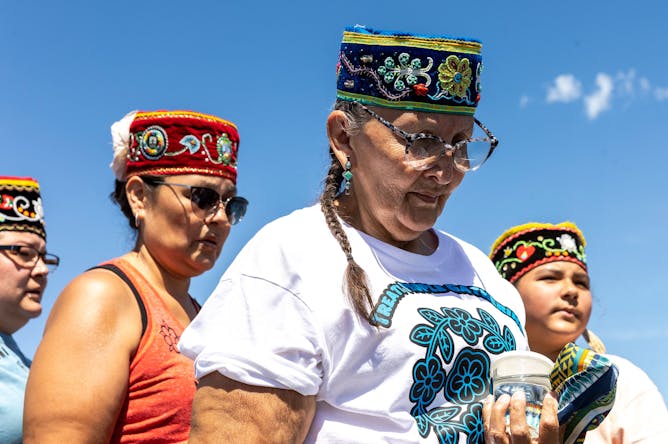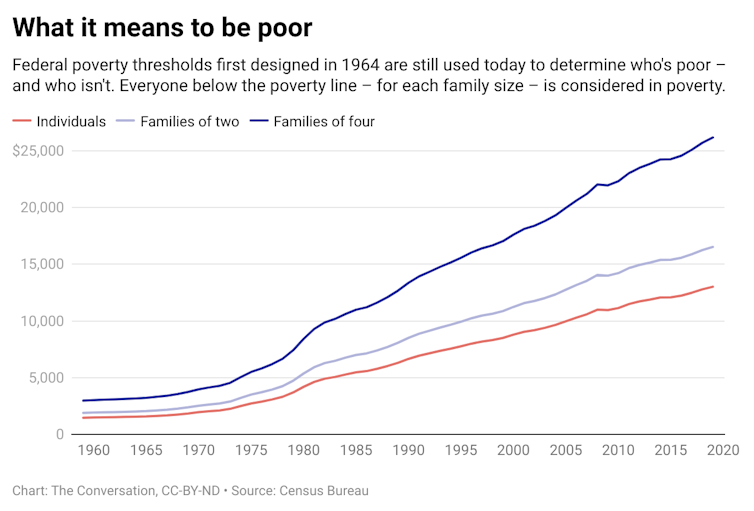|
|
|
|
When does a protest become an act of religious expression? For many Indigenous environmental activists, protest in itself is a spiritual act – they see themselves as protectors of sacred land. Demonstrations, such as a recent gathering against the building of a pipeline on traditional Ojibwe land in northern Minnesota, incorporate prayer and rituals to sanctify natural places, such as land and rivers.
This is important when looking at the wave of anti-protest laws put in place by more than 30 states in recent years, environment studies professor Rosalyn LaPier argues. With increased jail time and punitive fines for activists engaged in civil disobedience, such legislation has “the potential to infringe on the First Amendment right of religious freedom…because Indigenous protests often transform places of protest into places of religious practice and even pilgrimage.”
Also today:
|
Matt Williams
Religion & Ethics Editor
|

|
|

More than 30 U.S. states have passed laws intended to stop protests like the one against the Line 3 pipeline.
Kerem Yucel/AFP via Getty Images
Rosalyn R. LaPier, The University of Montana
Native Americans have long struggled to practice their spiritual rituals and protect their landscapes. Crackdowns on Indigenous protests could further erode the free exercise of their religions.
|
Politics + Society
|
-
Vinodh Venkatesh, Virginia Tech
In Latin America, common citizens have often donned outlandish outfits and comic book-inspired personas to lead demonstrations and promote social change.
|
|
Economy + Business
|
-
Mark Robert Rank, Washington University in St Louis
Newer measures of poverty may do a better job of counting America's poor, which is necessary to helping them.
-
Darryl Scriven, Clarkson University; Robyn Hannigan, Clarkson University
There are five basic things to address while starting your own company: Need, idea, product, setup and market.
|
|
Education
|
-
Shalini Shankar, Northwestern University
A scholar of spelling bees explains why Zaila Avant-garde's victory at the National Scripps Spelling Bee is significant from a historical perspective.
|
|
Science + Technology
|
-
John M. Horack, The Ohio State University
Both Virgin Galactic and Blue Origin are sending spacecrafts – and their billionaire founders – into suborbital flight. But what differentiates a suborbital flight from a trip around Earth?
|
|
Health
|
-
Gabriel Neal, Texas A&M University
Left untreated, heat stroke can be fatal, and the elderly are the most at risk.
|
|
Arts + Culture
|
-
Michael J. Poulin, University at Buffalo
It's easy to assume that the practice has few, if any, downsides. But a new study explored some of its social repercussions.
-
Marlene Daut, University of Virginia
After enduring decades of exploitation at the hands of the French, Haiti somehow ended up paying reparations – to the tune of nearly $30 billion in today's money.
|
|
Trending on site
|
-
Claire L. Adida, University of California San Diego; Adeline Lo, University of Wisconsin-Madison; Lauren Prather, University of California San Diego; Melina Platas, New York University Abu Dhabi; Scott Williamson, New York University Abu Dhabi
Research suggests that reminding Americans – Democrats and Republicans – of their family history creates empathy for immigrants and more favorable views toward immigration.
-
Frank LoMonte, University of Florida
Former President Trump is asking the courts to do what tycoon Trump once would have denounced: tell some of America’s most powerful corporations that they have no choice who they do business with.
-
Joshua E. Kane, Arizona State University
Celebrities and businesses have drawn criticism for cultural appropriation. An expert provides guidance on when it is sharing another culture out of appreciation and when it is appropriation.
Today’s graphic

|
|
| |
| |
| |
| |
| |
| |
|
|
|
|
|
|
|